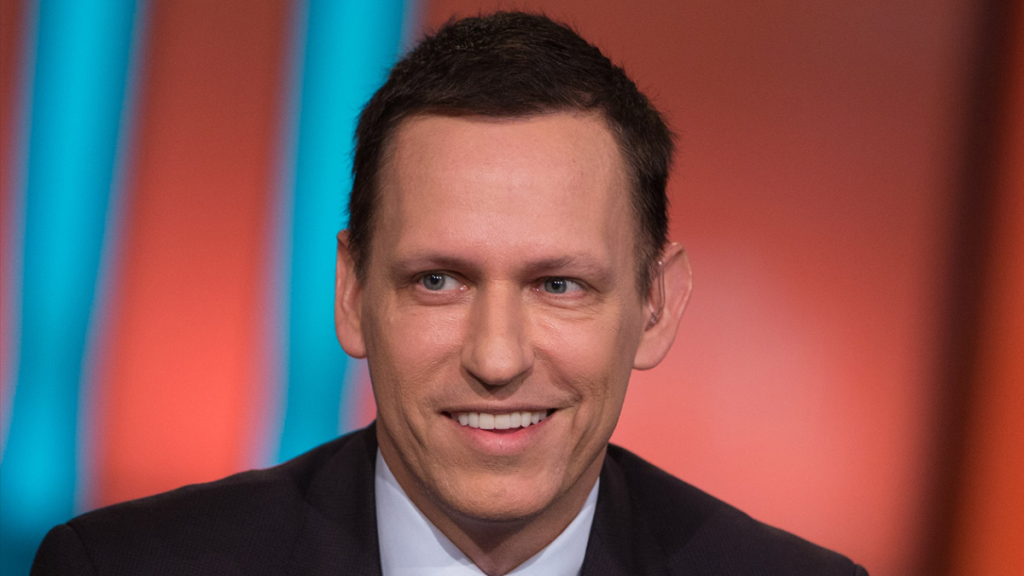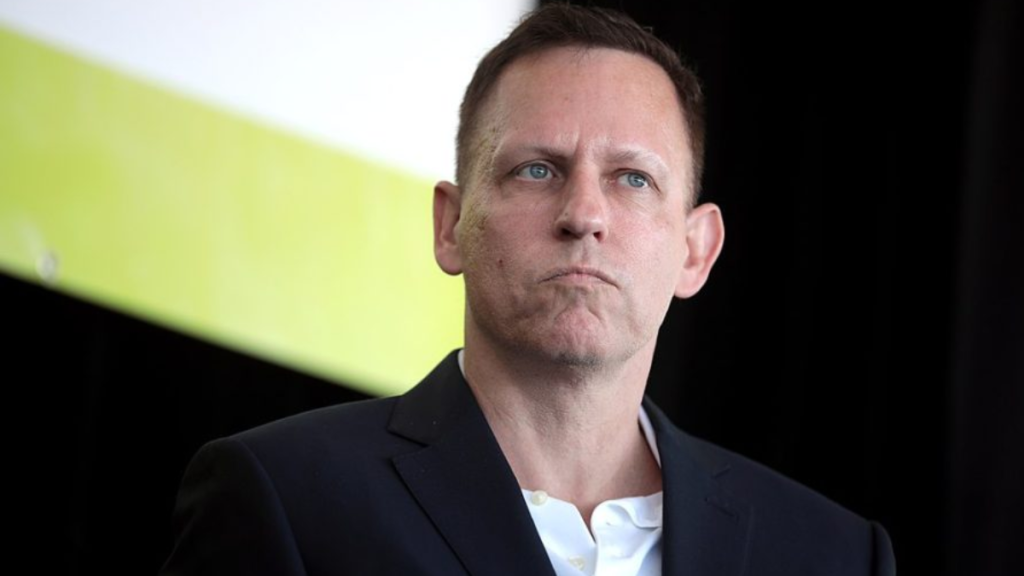
Advertisement
The Billionaire Architect of Innovation
Peter Thiel, one of Silicon Valley’s most enigmatic billionaires, has carved a niche in the world of technology, finance, and philosophy. Known for co-founding PayPal and investing early in Facebook, his career spans across venture capital, political commentary, and radical innovation. With an estimated networth of over $7 billion as of 2025, Thiel stands as a key figure in the global tech landscape. His investments have shaped entire industries and disrupted conventional thought about startups, education, and personal freedom.
As Thiel once said, “Every moment in business happens only once. The next Bill Gates will not build an operating system.”
This contrarian mindset has defined much of his career, steering him away from traditional paths and into groundbreaking ventures.
Born in Germany and raised in the United States, Thiel exemplifies the immigrant success story fused with intellectual rigor. From excelling in mathematics and philosophy to entering Stanford Law, his academic prowess paved the way for a deep engagement with technology and innovation. Over the years, his influence has extended beyond the boardroom to think tanks, political campaigns, and even higher education reforms.
“Brilliant thinking is rare, but courage is in even shorter supply than genius,” Thiel famously noted,
highlighting his belief in bold decision-making. This courage has helped him navigate the volatile world of tech startups and emerge as a long-term player in high-stakes capitalism.
Peter Thiel’s Early Life, Education, and Rise to Tech Fame
Peter Andreas Thiel was born on October 11, 1967, in Frankfurt am Main, West Germany. When he was just one year old, his family moved to the United States, eventually settling in Foster City, California. A child prodigy, Thiel showcased an early affinity for mathematics and strategic thinking, particularly through his enthusiasm for chess, a game he excelled at during his youth.
Thiel attended Stanford University, earning a B.A. in Philosophy in 1989. His academic foundation in classical thought and skepticism of groupthink would later influence his contrarian investment philosophy. After Stanford, he pursued a J.D. at Stanford Law School, graduating in 1992. Though he clerked briefly and flirted with legal practice, Thiel found himself increasingly disillusioned with the traditional career paths that law offered.
He channeled his energy into publishing The Stanford Review, a conservative-libertarian campus paper, which became a breeding ground for future Silicon Valley thinkers. This experience was vital in shaping Thiel’s worldview—a mix of libertarian politics, innovation-focused capitalism, and individual freedom.
His first entrepreneurial venture came in 1996 with Thiel Capital, a hedge fund he launched with just $1 million in assets under management. It was the beginning of his journey into finance and tech. In 1998, he co-founded Confinity, which merged with Elon Musk’s X.com to become PayPal. The company revolutionized online payments, and in 2002, eBay acquired it for $1.5 billion.
As the co-founder and CEO of PayPal, Thiel mentored future tech leaders like Elon Musk, Reid Hoffman, and Max Levchin—together known as the “PayPal Mafia.” Their influence extended to companies like LinkedIn, YouTube, Yelp, and Tesla.
In the words of tech journalist Sarah Lacy, “The PayPal Mafia is like the band that launched a thousand startups.” This fraternity-like group fundamentally reshaped the Silicon Valley startup ecosystem, and Thiel stood at its helm.
His contrarian views, rigorous intellect, and fearless investing made Thiel a trailblazer in the world of tech entrepreneurship. The PayPal success not only catapulted him to wealth but laid the foundation for a sprawling empire of innovation.

How Peter Thiel Built His Billion-Dollar Net Worth Through Investments
Peter Thiel’s immense net worth didn’t just come from co-founding PayPal—it was amplified by a series of bold, visionary investments that turned small bets into monumental gains. His most famous and lucrative investment was a $500,000 stake in Facebook in 2004 for 10.2% of the company. This single investment turned into over $1 billion when Facebook went public in 2012, marking Thiel as one of the savviest venture capitalists in history.
As Thiel once stated, “The best investment you can make is in companies that are doing something truly unique.” His approach defies conventional wisdom, focusing on monopolistic tendencies and scalable innovation rather than overcrowded markets.
In 2005, Thiel founded Founders Fund, a venture capital firm that went on to invest in SpaceX, Airbnb, Stripe, Lyft, and Spotify. Each of these companies has become a defining force in its sector, further adding to Thiel’s financial and intellectual capital. According to Crunchbase, Founders Fund has raised over $11 billion across multiple funds, consistently ranking among the top-performing VCs.
Thiel is also the chairman and co-founder of Palantir Technologies, a big data analytics company valued at nearly $30 billion in 2025. Originally built to support national security operations post-9/11, Palantir has since expanded into healthcare, finance, and retail sectors. His role in Palantir reinforced his reputation for building companies that merge technology with state-level utility.
“Great companies do something important and valuable that others cannot easily replicate,” Thiel said in his book Zero to One.
His belief in technological singularity and the importance of first-mover advantage has been central to his investment decisions.
He also backed early-stage biotech companies like Stemcentrx, acquired by AbbVie for $10 billion, and invested in cryptocurrency ventures including BitPay and Block.one. Thiel’s investments are not just about capital—they reflect deep convictions about the future of humanity, decentralization, and the value of breakthrough ideas.
According to Bloomberg, Thiel’s portfolio has generated annual returns of over 25%, outperforming traditional hedge funds and the broader venture capital landscape. His long-term, high-risk, high-reward strategies have defined a generation of tech investment.
As financial journalist Kara Swisher put it, “Thiel doesn’t just chase the next big thing—he builds it from the ground up.” His sharp instincts, willingness to go against the grain, and deep philosophical grounding have enabled him to spot opportunities others often miss.
Through calculated risks and a firm belief in radical innovation, Peter Thiel turned early insights into generational wealth, making him not just a tech billionaire but a visionary architect of the modern digital economy.

Inside Peter Thiel’s Assets, Roth IRA Controversy, and Global Influence
Peter Thiel’s net worth isn’t just about stock value—it’s a mosaic of high-value assets, controversial financial strategies, and a global lifestyle that reflects his belief in personal sovereignty and technological evolution. Central to this conversation is his Roth IRA account, reportedly worth over $5 billion as of recent estimates.
The Roth IRA controversy came into public view through a 2021 ProPublica report, which revealed that Thiel had used a little-known tax loophole to place undervalued startup shares—specifically Facebook—into a Roth IRA in 1999. Normally used by middle-class Americans for retirement savings, the Roth IRA’s tax-free growth advantage gave Thiel a legal but controversial way to shelter massive gains.
In response, Thiel maintained that “I believe in the rule of law. Everything done was legal and within the boundaries of U.S. tax policy.”
His defenders argue that Thiel merely used the tools available within the system, while critics question the ethics of billionaires utilizing structures meant for average citizens.
Beyond U.S. borders, Thiel has acquired citizenship in New Zealand, where he owns an expansive estate in the South Island. The move reflects his ongoing interest in escape routes from political and economic instability—a theme he’s discussed in tech and libertarian circles.
Thiel’s asset portfolio includes luxury real estate in Los Angeles, Miami, and New Zealand, as well as interests in private equity, venture capital, and digital assets. He’s also known for philanthropic initiatives through the Thiel Foundation, which funds anti-aging research, seasteading projects, and the Thiel Fellowship—an initiative that pays students to drop out of college and pursue entrepreneurship.
As Thiel once said, “You are not a lottery ticket.” His worldview values individual agency over institutional control, and this is mirrored in how he manages his wealth and influence.
Politically, Thiel has been an active supporter of conservative and libertarian causes. He notably supported Donald Trump’s 2016 campaign, becoming one of the few Silicon Valley moguls to publicly endorse the candidate. While this move drew criticism from peers, it also solidified Thiel’s status as a political outlier willing to defy mainstream narratives.
According to political analyst Andrew Sullivan, “Thiel is less a partisan and more a philosopher-king of techno-libertarianism.” This unique identity blends financial power with ideological drive, allowing him to wield soft influence in both governmental and corporate arenas.
Whether it’s disrupting tech, reforming education, or reshaping global finance, Peter Thiel’s reach is far and wide. His assets are not only a reflection of monetary success but also of a deeply considered worldview—one that questions norms and constantly seeks to build a future that’s bold, efficient, and fiercely independent.
Peter Thiel’s Enduring Legacy in Tech and Capitalism
Peter Thiel’s journey from a German-born immigrant to a Silicon Valley billionaire is a masterclass in vision, risk-taking, and unapologetic individualism. With a networth exceeding $7 billion and influence that spans technology, politics, and philosophy, Thiel’s legacy is far from over. As the digital era continues to evolve, so too will his footprint—shaping not just the world of innovation, but the very foundations of modern capitalism.
